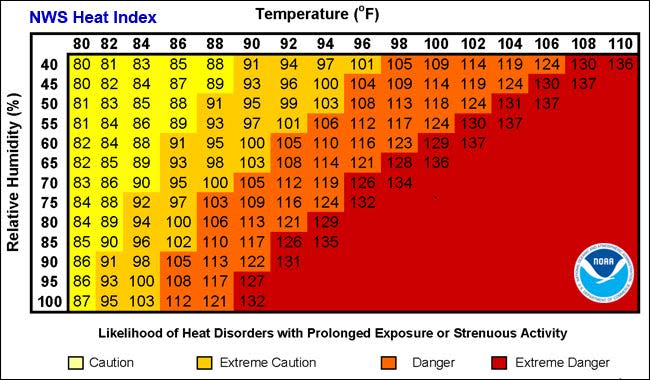First-ever Excessive Heat Warning issued for Jacksonville. Here's what that means.
After two consecutive days in which temperatures hit 98 degrees, the National Weather Service is forecasting an expected high of 101 degrees in Jacksonville.
With that forecast, the weather service’s Jacksonville office has issued an Excessive Heat Warning for portions of Northeast Florida and Southeast Georgia, including Duval, St. Johns, Clay and Nassau counties, where it will feel like 110 degrees or hotter.
In some areas, including western Duval County, it could feel hotter than 115 degrees today, the weather office said.
What you should know: Weather watches, warnings issued for Jacksonville area. See radar, current conditions
Hot weather terms: What do heat warnings and watches mean? Terms you should know
Hot car death: Baker County infant dies after being left in hot vehicle
According to First Coast News meteorologist Lauren Rautenkranz, the warning is the first of its kind issued for Duval County and the first in the area issued since July 2012, when the National Weather Service issued and Excessive Heat Warning for areas of Southeast Georgia.
Friday’s forecast high of 101 degrees would be the highest temperature recorded in Jacksonville since 101 degrees in July 2016, according to NWS data. The area saw high temperatures of 100 degrees in 2022 and 2019.
For the first 20 days of July, Jacksonville has recorded five days where high temperatures reached 98 degrees, helping to raise this month’s average high temperature to 95.1 degrees, compared to the normal average of 91.8 degrees. (The lowest high temperature for the month was 88 degrees on July 10.)
The record high temperature for Jacksonville on this date is 102 degrees, set in 1942.
Heat index: High temperatures, high humidity can be deadly combination
When high temperatures combine with high humidity levels, people feel hotter than the actual temperature, according to the University of Florida.
The heat index is a measure of how hot it really feels when relative humidity is factored in with the actual air temperature.
Increased moisture in the air limits the body’s ability to cool off through sweating.
When the heat index reaches 105 degrees or higher, conditions can become dangerous for both people and pets.
What's an excessive heat warning?
An excessive heat warning is issued within 12 hours of the onset of extremely dangerous heat conditions, according to the National Weather Service.
This warning generally is issued when the maximum heat index temperature is expected to be 105 degrees or higher for at least two days and night time air temperatures will not drop below 75 degrees.
If you don't take precautions immediately when conditions are extreme, you may become seriously ill or even die.
What's an excessive heat watch?
Heat watches are issued when conditions are favorable for an excessive heat event in the next 24 to 72 hours. A watch is used when the risk of a heat wave has increased but its occurrence and timing is still uncertain.
What's a heat advisory?
A heat advisory is issued within 12 hours of the onset of extremely dangerous heat conditions. The general rule of thumb for this advisory is when the maximum heat index temperature is expected to be 100 degrees or higher for at least two days, and night time air temperatures will not drop below 75 degrees.
Take precautions to avoid heat-related illness.
What is an excessive heat outlook?

These outlooks are issued when the potential exists for an excessive heat event in the next three to seven days. An outlook provides information to those who need time to prepare.
Tips to keep your children safe from heat
Newborns, infants and young children are particularly vulnerable to heat-related illness and death. Their bodies are less able to adapt to heat than adults.
Children under 4 years of age experience higher hospital admissions for respiratory illnesses during heat waves.
The effects are more severe on children because their bodies warm at a faster rate than adults.
Keep children cool by:
Having them drink plenty of water. Make sure fluids are not very cold or high in sugar or sweeteners.
Take lots of breaks.
Wear light-colored and lightweight clothing.
Limit playing outdoors to cooler times of the day.
Staying safe in vehicles when it's hot
Even on mild days in the 70s, studies have shown the temperature inside a parked vehicle can rapidly rise to a dangerous level for children, pets and even adults. Leaving the windows slightly open does not significantly decrease the heating rate.
Touch a child's safety seat and safety belt before using it to ensure it's not too hot before securing a child.
Never leave a child unattended in a vehicle, even with the windows down, even for just a minute.
Teach children not to play in, on, or around cars. They could accidentally trap themselves in a hot vehicle.
Always lock car doors and trunks — even at home — and keep keys out of children's reach.
Always make sure children have left the car when you reach your destination. Don't leave sleeping infants in the car.
Heat can be dangerous for outdoor workers, so how can you stay safe?
Outdoor workers can be at a higher risk to the effects of excessive heat. Here are a few suggestions to follow:
Drink water often.
Rest and cool down in the shade during breaks.
Gradually increase workload and allow more frequent breaks for new workers or workers who have been away for a week or more.
Know symptoms, prevention, and emergency response to prevent heat-related illness and death.
Check weather forecasts ahead of time to be better prepared.
Cheryl McCloud of USA TODAY Network-Florida contributed to this report.
This article originally appeared on Florida Times-Union: NWS issues Excessive Heat Warning for Jacksonville, Duval County

